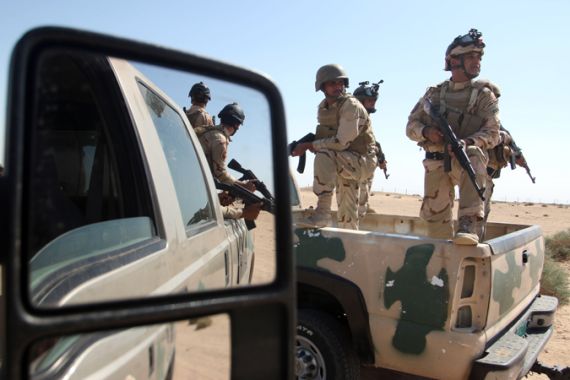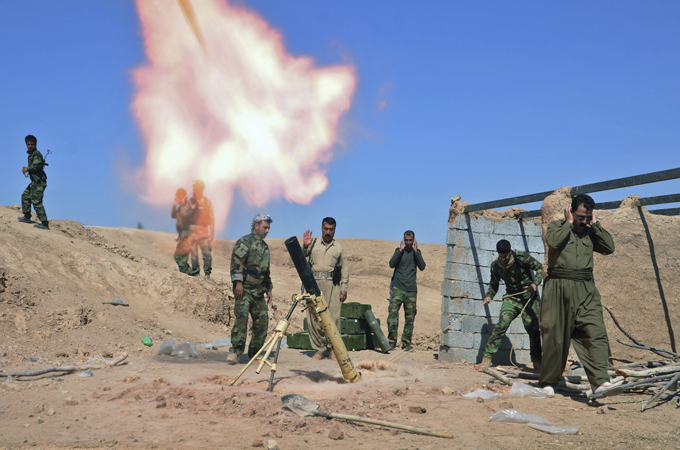Iraqi army to raid ISIL fighters’ ‘hub’
Iraqi government is shifting priority to win the battle of Salahaddin, a hub for ISIL fighters.

Published On 17 Dec 2014
Baghdad – Multiple fronts, opened by fighters with the Islamic State of Iraq and the Levant (ISIL), in addition to a serious shortage of weapons and equipment, may force the Iraqi government to re-prioritise and give up more towns in Anbar province in order to gain control of Salahaddin, Iraqi military officers and tribal fighters told Al Jazeera.
ISIL fighters seized the northern province of Salahaddin and several areas of Kirkuk only days after overrunning the city of Mosul in June without any real resistance from Iraq’s beleaguered security forces.
They have since taken over most of the cities and towns of the vast desert province of Anbar, which extends to the border with Syria.
Iraqi military officers and anti-ISIL Sunni tribal fighters said the group has adopted new tactics in the past few weeks, attacking several areas simultaneously to distract Iraqi forces and drag them into battles without clear targets in an effort to deplete their ammunition and keep them busy.
“They [ISIL fighters] are attacking multiple areas at the same time. Two weeks ago, they attacked our troops at the university [in northern Tikrit] from al-Muhzam, al-Sainiyah, Baiji and al-Khamrah towns,” Sheikh Ghasham Sabhan al-Joubori, who leads the anti-ISIL tribal fighters in northern Salahaddin, told Al Jazeera.
“They aim to terrify the troops by sending a message saying that they are everywhere, delay their progress and deplete their ammunition.”
After the dramatic collapse of the Iraqi security forces in June, Iraqi security authorities had to rebuild their dismantled military divisions, with many troops either having deserted or gone missing.
Iraqi Prime Minister Haider al-Abbadi recently launched a campaign to rid the Iraqi army of corruption, revealing last month that there were 50,000 “ghost soldiers” in four divisions whose names were on the payroll, but who were not showing up to work.
In response to ISIL’s tactics and the army’s lack of weapons and equipment, Abbadi, as commander-in-chief of the armed forces, opted to re-prioritise in Anbar and Salahaddin, according to Iraqi military commanders and federal security advisers, three of whom were involved in the decision-making process in the Baghdad military operations centre.
The centre remotely runs military operations in Salahaddin, Anbar, and Diyala provinces.
”The
important than rescuing the towns of Anbar.”]
“The Iraqi commanders are confused because of the attrition war that ISIL leads against the Iraqi troops in many areas recently, and we have had to rearrange our priorities in respect to the fronts in Anbar and Salahaddin provinces,” a federal security adviser told Al Jazeera, on condition of anonymity.
“We believe that ending the liberation battles of Salahaddin, from the military perspective, is [more] important than rescuing the towns of Anbar.”
Backed by Shia militias and the Kurdish forces, Iraqi Special Forces have driven ISIL fighters out of vast areas in the southern and northern parts of Salahaddin and broken the five-month siege of the country’s biggest oil refinery.
But Tikrit, the capital of Salahaddin, along with Shirqat and Hawija – seen by Iraqi military commanders as a hub for ISIL fighters in the region – remain out of government control. In addition, ISIL fighters still have an open and direct supply route that extends from Diyala to Mosul.
“Our strike force is fighting in Salahaddin, and they have been making good achievements to maintain the momentum there.
There is no way to risk that by withdrawing [troops] from Salahaddin to be sent to Anbar,” a senior military officer who serves in the Ministry of Defence in Baghdad and is familiar with the new military operations told Al Jazeera, on condition of anonymity.
“Here we are not talking about what we like or dislike; it is a battle that we have to win. Building the momentum in Salahaddin is much more important to fight ISIL in the long run than gaining back control over a town here or there in Anbar.”
The commander, in addition to several federal security officials, said their tactic was to gain back control over scattered and small strategic towns, in order to deprive ISIL of a long, continuous route through inhabited areas, forcing them to redeploy in certain open areas and routes vulnerable to air strikes.
“Salahaddin is a link point for three provinces; Mosul, Diyala and Kirkuk. If I left Salahaddin and went to Anbar, hundreds of sleeper cells which already existed in southern Kirkuk, the chain of Humreen Mountain [which extends from Diyala through Salahaddin to Kurdistan], will be revived and I will lose this crescent,” the commander said.
“The situation in Anbar is totally different, as we still have several well-protected military bases where we have troops and the training and equipping of the loyal tribesmen are going on, plus the US military advisers who are entirely backed by the US air force.”
 |
| Officials say the situation is deteriorating as ISIL has been attacking remaining towns [Reuters] |
With ISIL fighters having seized most of the cities and towns of the Sunni-dominated Anbar province since January, Anbar’s local officials and tribal leaders say the situation is continuing to deteriorate, as ISIL has been attacking the remaining towns on an almost daily basis.
The military bases of Ain al-Assad, al-Baghdadi and Habaniya are still under the control of the Iraqi government.
On Saturday, ISIL fighters stormed al-Wafa, 45km west of Ramadi, killing at least 19 police officers and trapping others inside their headquarters.
Three days earlier, ISIL fighters executed 21 Sunni tribal fighters after capturing them near the town of al-Baghdadi, which hosts one of the biggest military bases in Anbar.
“The situation in Anbar is very critical. Anbar cannot stand more than that; it is on the brink of the abyss,” Sheikh Naim al-Gouad, a tribal leader deployed in the Ain al-Assad military base in Anbar, told Al Jazeera in a telephone interview. “If the government does not move soon to boost the troops in Ramadi, Khalidiya and liberate Heet, Anbar will fall [into the hands of ISIL] and Daesh [ISIL] will be at the gate of Baghdad.”
Iraqi military officers and security officials say the necessary preparations for combating ISIL in Anbar have not yet been completed, so Iraqi forces, for now, must rely largely on defensive tactics.
Support from anti-ISIL Sunni tribesmen for Iraqi authorities and the US-led international military coalition is vital, as the coalition’s proposed plan involves establishing a local ground alliance of tribes, and training and equipping them to fight alongside Iraqi troops.
Fifteen hundred US security personnel are already on the ground to advise and retrain Iraqis; about 50 were deployed in Ain al-Assad last month.
“The situation in Anbar has not changed … and we have not lost new areas [in] the battles [between our troops and ISIL groups],” a senior Iraqi military commander who serves in Ain al-Assad told Al Jazeera, on condition of anonymity.
The military commander said that US security experts would be responsible for training the anti-ISIL Sunni tribesmen, delivering the required air support and helping to provide the essential elements for battling ISIL in Anbar, while the Iraqi government would be responsible for arming and equipping the tribes and following US-proposed plans to liberate Anbar.
“We are not worried about Anbar,” he said. “Yes, it is a delayed battle, but … it’s just a matter of time.”
Source: Al Jazeera